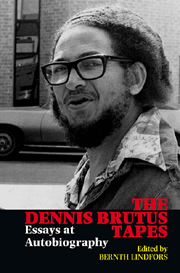Talking with Students
from POETRY
Published online by Cambridge University Press: 05 April 2013
Summary
[When Dennis Brutus came to The University of Texas at Austin in February 1970 to participate in a colloquium on “The Black Experience,” he spent most of his time talking about race and politics in South Africa. Throughout the day – which included a public lecture, a press conference, a television interview, and several meetings with students – he was bombarded with questions about apartheid, political oppression, revolution, and his own role in the South African struggle. Only once did he talk about his writing; this was in a large African literature class where he read and commented on several of his poems and invited questions from the students. What follows is a partial transcript of that class meeting and probably one of the most revealing excursions into the complex mind and imagination of an outstanding poet from Africa.]
I'm glad to be here, and it seems to me the most useful thing I can do is to spend most of the time answering questions on the things that interest you. I ought to warn you that I don't know all the answers, and when it comes to poetry, even my own, I don't always give the same answer to the same question. This may sound odd, but I believe one tends to look at the same thing at different times in different ways. I think only dead people don't change, and even they putrefy so that there is a form of change.
Another thing I should say is that I feel I know what I try to mean by my own poetry, and I think I know how it ought to be read in terms of meaning.
- Type
- Chapter
- Information
- The Dennis Brutus TapesEssays at Autobiography, pp. 157 - 168Publisher: Boydell & BrewerPrint publication year: 2011



